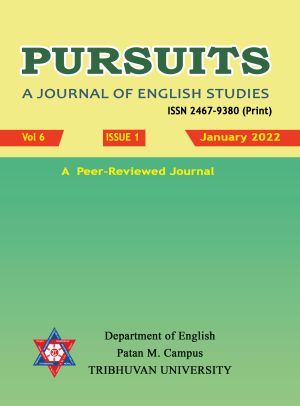Civic Education through Literature: A Case of Devkota’s “The Lunatic”
DOI:
https://doi.org/10.3126/pursuits.v6i1.46852Keywords:
Civic Education, literary texts, civic knowledge, civic skills, civic disposition, lunaticAbstract
This research paper examines the role of literary texts in implanting and enhancing civic sense with reference to Laxmi Prasad Devkota's poem "The Lunatic.” It primarily aims at excavating the aspects of civic education regurgitated in the poem through close textual analysis. As the process of affecting people’s beliefs, commitments, capabilities, and actions as members of communities, civic education occurs involuntarily from social institutions and communities. literary texts are important resource for civic education as the ideas and experiences depicted in the texts sensitize readers to enhance civic knowledge, civic skills and civic dispositions on the students and to understand their role as active citizens. not only for developing communicative competence, but also for imparting civic education. To meet the complexity of tough academic challenges and expectations, educational institutions including schools and universities aspire to excel in a particular field and fail to cover civic education in their curricula as a separate course material. By teaching literary texts they can fill this gap. While preparation for examinations is afforded priority, value formation, character building, and focusing on building ethical standards in learners are not given adequate emphasis in our university curricula. The poem “The Lunatic” demonstrates that the readers can understand what they should do and how they should behave as a human being. Ultimately this helps in the formation of their personality as a good citizen. Thus, teaching literary texts as a course content is an important ingredient in the overall personality development of learners.




